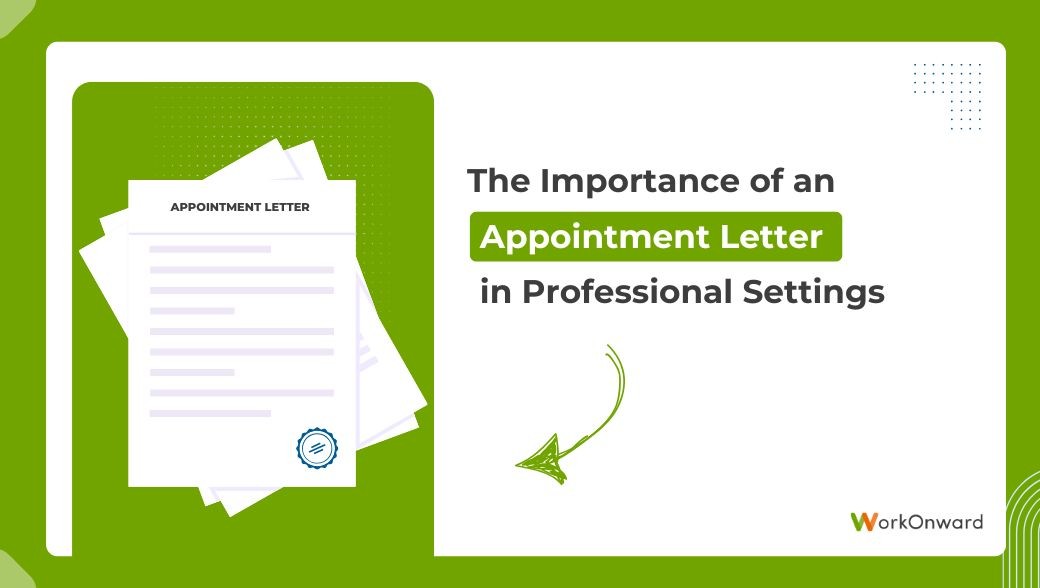An appointment letter is a formal document issued to a selected candidate by an employer for the official invitation of that candidate to join an organization. This letter is one of the most important steps of the recruitment process. The letter is a form of written confirmation of the job and its other terms and conditions.
We will discuss in detail the elements, importance, and writing guidelines for an appointment letter along with sample formats and templates in this article.
What is a Appointment Letter?
Appointment letter is the official correspondence that an employer writes to an selected candidate of the job position offer. The letter communicates specific details relating to a new job and title of position, nature of job, type of duties that are involved in it, kind of remunerations or compensation pay, working time, and a whole lot more.
Use of an Appointment Letter
Appointment letter is generally written to formalize the oral offer of the job position communicated.
It helps to bring out expectations regarding the position.
Legal Documentation: Important document in any employment when cases of legal tussles happen.se of an Appointment Letter
How to write an appointment letter
1. Company Information
Name of the organization
Address and contact details
Official letterhead
2. Candidate Details
Full name of the candidate
Address (optional)
3. Job Details
Position title
Reporting structure (e.g., manager or supervisor)
Job location
4. Terms and Conditions
Start date of employment
Probation period (if applicable)
Working hours and leave entitlement
5. Salary and Benefits
Base salary and any additional allowances
Payment frequency (e.g., monthly or bi-weekly)
Benefits like health insurance, bonuses, or perks
6. Job Responsibilities
A brief overview of the key responsibilities and expectations.
7. Signature and Acceptance
Signature of the employer or HR representative
Space for the candidate’s signature and date to indicate acceptance
Sample Appointment Letter Format

Why An Appointment Letter Is Important
Clarity and Transparency: It clearly communicates the role, expectations, and benefits to be availed of.
Legal Protection: It offers a written proof of the mutual agreed terms of employment to both parties.
Professionalism: It projects the company as a structured entity that maintains all recruitment processes
How to Draft an Appointment Letter
Professional tone: The writing should be formal and inviting.
Clearly and concisely: Use no ambiguous wordings but convey all details.Be Clear and Concise: Avoid ambiguity by stating all details clearly.
Tailor to the Role: Customize the letter to suit the specific position and responsibilities.
Double-Check Details: Ensure accuracy in terms such as salary, benefits, and start date.
Encourage Acceptance: Include clear instructions for the candidate to sign and return the letter.
Common Mistakes to Avoid
Omitting Key Details: Ensure all necessary information, such as probation periods and reporting structure, is included.
Using Generic Templates: Tailor the letter to the specific candidate and role.
Overlooking Legal Compliance: Verify that the letter adheres to local labor laws.
Delays in Issuance: Send the letter promptly after the offer is made to maintain professionalism.
Appointment Letter Templates
1. Standard Appointment Letter
Best for entry-level and mid-level roles.
Includes basic job details and compensation.
2. Managerial Role Appointment Letter
Highlights leadership responsibilities and additional benefits.
3. Probationary Appointment Letter
Specifies probation terms and evaluation criteria.
4. Remote Work Appointment Letter
Includes clauses related to remote work policies and expectations.
Conclusion
An appointment letter is critical during the recruitment process, as it bridges the gap between the job offer and the start date of employment. With careful drafting and issuance of the letter, employers establish a positive, forward-looking tone for their relationship with the new hire.
Whether you’re an HR professional or a business owner, understanding the nuances of an appointment letter ensures a smooth and professional onboarding experience.







